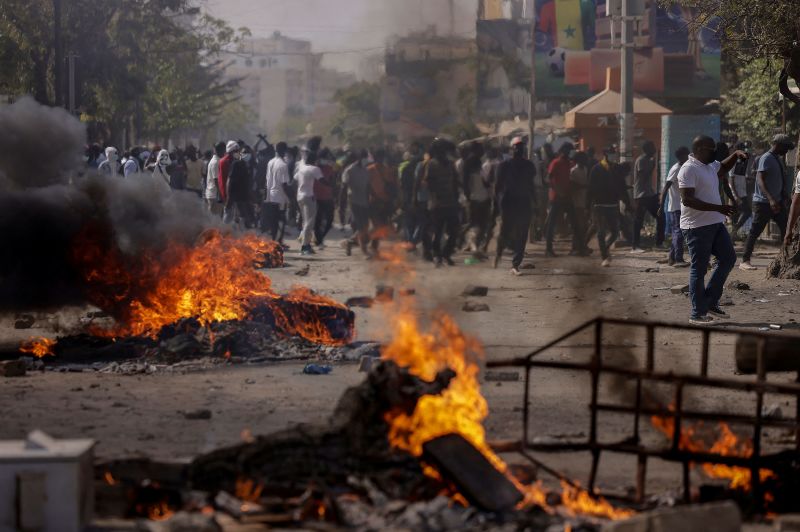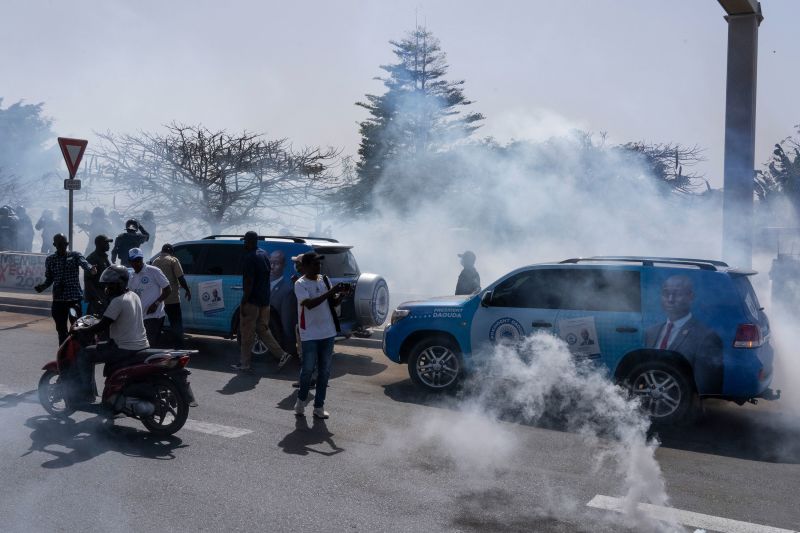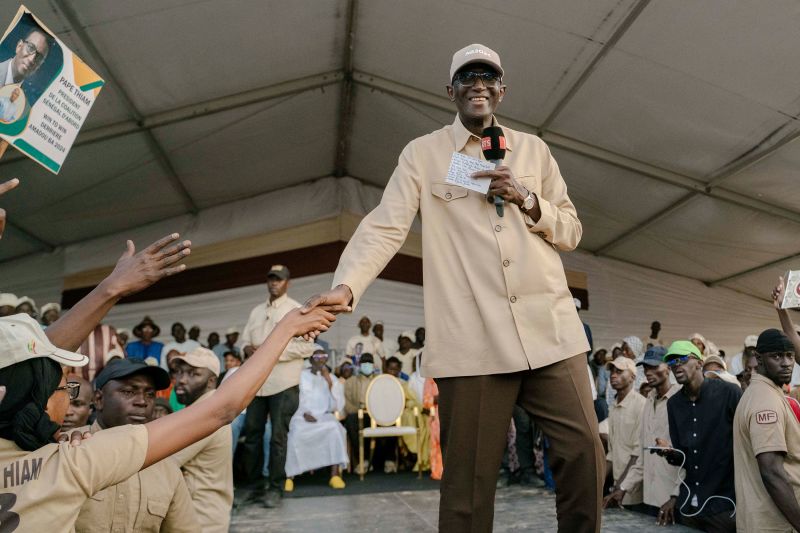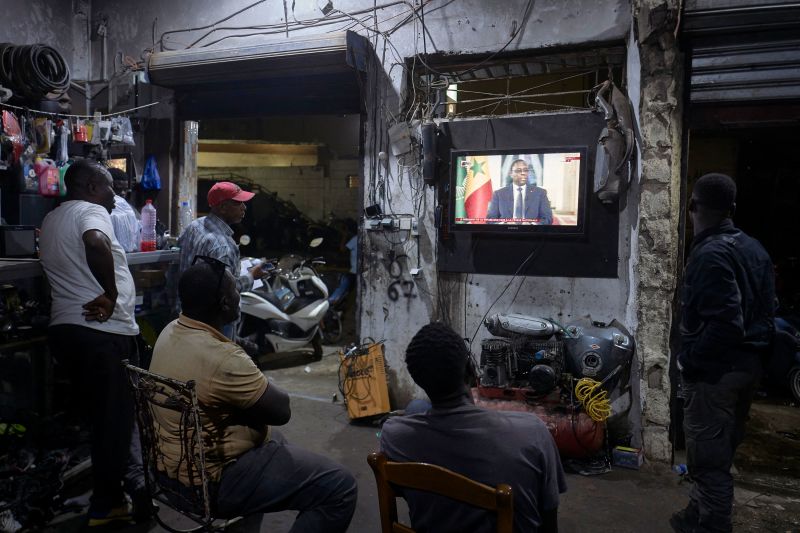
Senegal's Democracy at a Crossroads: Presidential Elections on the Horizon

As Senegal gears up for its upcoming presidential elections, the nation stands at a critical juncture with the democratic process under scrutiny. The delayed yet significant election on Sunday will serve as a pivotal moment in assessing the strength of Senegal's democratic foundation.
Senegalese voters are set to select their next president on Sunday in an important election that will determine the future of their democracy.
The current President, Macky Sall, has pledged to peacefully transfer power to the newly elected leader following a decision by the country's highest court to reject his request to postpone the election for 10 months. Sall's second and final term is ending on April 2nd.
Several candidates are running for office, but the top contenders are two former tax inspectors. One is backed by the government, while the other is supported by the main opposition coalition.
Despite this election excitement, tensions have been rising in the West African country. Recent protests have taken a violent turn, with young people angrily setting fires in the streets. They are demanding that the election be held before the current leader, Sall, steps down, rather than after as he suggested.
Sall, who has been the leader of Senegal for 12 years, is leaving behind a mixed legacy. He is facing accusations of destabilizing the country by trying to stay in power longer. This includes cracking down on the opposition and suddenly postponing elections just three weeks before they were scheduled to take place.
Despite the criticism, Sall has shown no remorse for delaying the vote.
This week, he told the BBC that he has no apology to make as he believes he did nothing wrong. He stated that all his actions have been in accordance with the law and regulations.
Senegal is recognized as one of the most stable democracies in the coup-prone West African region.
Senegalese demonstrators protest against the postponement of the Feb. 25 presidential election, in Dakar, Senegal February 9, 2024.
Senegalese demonstrators protest against the postponement of the Feb. 25 presidential election, in Dakar, Senegal February 9, 2024.
Polls are scheduled to open at 8:00 am (local time) on Sunday and will close at 6:00 pm. The electoral commission announced this, marking the beginning of a highly competitive presidential election that experts believe is wide open and unpredictable.
In a tense political campaign season, analysts are prepared for a possible increase in violence, according to Ousmane Sene, the head of the West African Research Center (WARC) based in Dakar.
Sene stated, "The likelihood of unrest is higher if the Pastef candidate, part of the main opposition coalition, loses, as they have been questioning the reliability of Senegalese institutions."
A variety of candidates are running for the presidency. There are 19 candidates in total, all hoping to succeed Sall. Each candidate is offering solutions to address the most urgent issues facing the country.
Dakar-based political analyst Mamadou Thior believes that the upcoming election will mainly be a competition between two candidates. President Sall's chosen candidate Amadou Ba, representing the ruling coalition, and Bassirou Diomaye Faye, who is standing in for opposition leader Ousmane Sonko. Sonko was disqualified from running in the election by the Senegalese Supreme Court due to a defamation conviction in January.
Senegalese riot police lobs tear gas at supporters of opposition presidential candidate Daouda Ndiaye in Dakar, Senegal, Sunday, Feb. 4, 2024.
Senegalese riot police lobs tear gas at supporters of opposition presidential candidate Daouda Ndiaye in Dakar, Senegal, Sunday, Feb. 4, 2024.
Stefan Kleinowitz/AP
Related article
Senegal was Africa’s poster child for democracy. Where did it all go wrong?
Sonko's request to reverse a libel conviction that resulted in a six-month suspended prison sentence was denied by the highest court, putting his presidential aspirations at risk.
The 49-year-old outspoken opposition figure has encountered numerous legal troubles since 2021. While he was acquitted of a rape accusation in the previous year, he was convicted of corrupting minors, considered "immoral behavior" towards individuals under 21 according to the country's laws. His followers believe that his legal challenges are driven by political motives.
Sonko has garnered strong backing from the majority of Senegalese youth, who make up more than 60% of the population.
Even with the shorter campaign durations, both contenders have ignited passionate backing and discussions throughout the nation.
Ba, a former tax inspector and minister for finance, decided to step down as prime minister in March to focus on his campaign for the Senegalese presidential election. He has less than three weeks to prepare for the vote.
Former Prime minister Amadou Ba, candidate for outgoing president's Alliance For the Republic party (APR), addresses a campaign meeting ahead of Senegal's Presidential elections in Diourbel on March 19, 2024.
Former Prime Minister Amadou Ba, who is running as a candidate for the Alliance For the Republic party (APR) led by the outgoing president, spoke at a campaign rally in Diourbel on March 19, 2024. The event took place in preparation for the upcoming Presidential elections in Senegal.
Carmen Abd Ali/AFP/Getty Images
Faye, aged 44, used to work as a tax inspector and was also detained for political reasons. He was in prison from April last year until he was released last Thursday. With just over a week left before the election, Faye has been busy campaigning.
In November, Faye was selected as a backup candidate for Sonko. Their political party, Pastef, was dissolved by the government, so they joined forces with other opposition parties. Recently, both Faye and Sonko were released from prison after President Sall granted amnesty to political prisoners.
A supporter of the coalition of anti-establishment candidates holds a Senegalese flag as they sit on top of a wall during a campaign rally in Dakar on March 10, 2024.
A supporter of the coalition of anti-establishment candidates holds a Senegalese flag as they sit on top of a wall during a campaign rally in Dakar on March 10, 2024.
In order to become president, a candidate needs to get more than 50% of all the votes. If no candidate achieves this in the first round, there will be a run-off election two weeks later. The electoral body of Senegal stated that out of the country's 18 million people, just over seven million are registered to vote in this election.
Thior believes that the electorate is open to "new faces" and predicts that the next president could come from the opposition. According to Thior, the Senegalese people are eager for change and are likely to support a candidate from the opposition in the upcoming election. He mentioned that although Ba may have the potential to be the right leader, some voters view him as a continuation of the current president, Macky Sall, who has been in power for 12 years. There is a strong desire for a new direction in Senegal.
Former prime minister Idrissa Seck, who narrowly lost to Sall in the 2019 election, is one of the prominent candidates. In an interview with CNN last year, he expressed his belief that the next president is likely to come from the opposition, and he is working diligently towards that goal.
Faye, speaking to Senegalese media, emphasized the importance for voters to make a decision between continuity and rupture.
"If the people of Senegal are looking for a change in leadership that prioritizes transparency in handling public funds and fair distribution of resources, then they should consider me for the position of President," stated Faye. He also highlighted the importance of declaring assets, a practice he has already followed and encouraged Ba to do the same. However, Faye did not mention the specific role that his close ally Sonko would have in his potential government.
What are the key concerns raised in this statement?
At the heart of this election are the concerns of Senegal’s youth.
They, like other voters, are seeking urgent solutions to high unemployment and rising food prices, according to Sene.
Hit by record high inflation which rose to 15% in 2022, Senegal is grappling with a cost-of-living crisis like many other countries on the continent and globally.
People watch the Senegal's President Macky Sall during a live press conference broadcast on the national television, in the district of Medina in Dakar on February 22, 2024.
On February 22, 2024, people in the district of Medina in Dakar watched Senegal's President Macky Sall during a live press conference broadcast on national television. The event was captured in a photo by Michele Cattani/AFP/Getty Images.
High levels of unemployment in Senegal have led to many young people leaving the country in search of better opportunities. They often embark on dangerous journeys on wooden boats across the Atlantic Ocean to reach the Spanish Canary Islands, with the dream of starting a new life in Europe.
Last year, the number of people migrating through the perilous Atlantic route reached a record high of almost 40,000 individuals. The International Organization for Migration has noted that these departures are frequently planned from the shores of Senegal.
Thior expressed concern about the increasing number of young people leaving the country by boat to reach Spain, with some tragically losing their lives at sea. Additionally, there are those attempting to enter the US via Nicaragua. This trend highlights the extreme desperation felt by these young individuals, which Thior attributes to President Sall's inability to generate job opportunities.
Senegal President Macky Sall
Senegal President Macky Sall
John Angelillo/Getty Images
Related article
Senegal’s Macky Sall vows to step down when official term ends
Sene mentioned that one concern is ensuring the fair distribution of incomes and revenues generated from the upcoming commercialization of gas and oil resources, which could impact how voters choose to vote.
Senegal has traditionally depended on revenue from sectors such as mining, tourism, construction, fishing, and agriculture. However, the focus has now shifted towards tapping into its oil and gas reserves, a move that the International Monetary Fund believes will positively impact the country's economy.
Ba, the candidate from the ruling coalition, started his campaign by pledging to provide "massive employment" opportunities for young individuals and enhancing the "purchasing power of households" through the creation of numerous jobs.
On the other hand, his rival Faye, who also promises to generate employment, focused on fighting against corruption during his campaign. Additionally, he vowed to review energy contracts as Senegal gears up for the commencement of its oil and gas production later this year.
“No country can develop when … corruption and embezzlement of public funds are endemic,” Faye said in a recent interview.
Editor's P/S:
The upcoming presidential election in Senegal is a pivotal moment for the country's democracy, as voters grapple with concerns over the future of their nation. The article highlights the tensions between the desire for change and the stability provided by the current president. The youth, who make up a significant portion of the population, are particularly vocal in their demands for solutions to unemployment and rising living costs. They are concerned about the lack of job opportunities and the high cost of living, which has been exacerbated by record inflation and the ongoing cost-of-living crisis.
The article also raises concerns about the potential for unrest if the opposition candidate loses, as they have expressed doubts about the credibility of Senegalese institutions. The disqualification of Ousmane Sonko, a popular opposition figure, has further heightened tensions. The candidates' promises to address the concerns of the youth and the country's economic challenges will likely play a key role in determining the outcome of the election.















